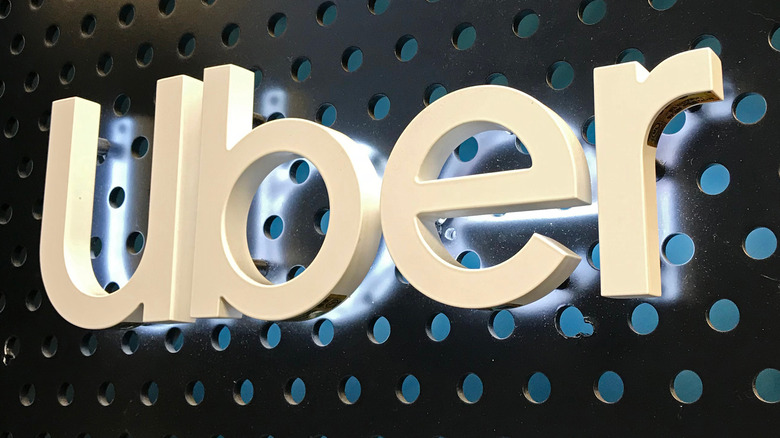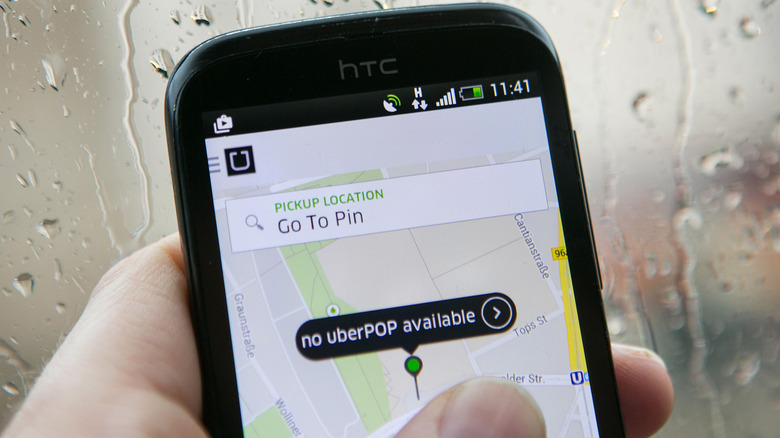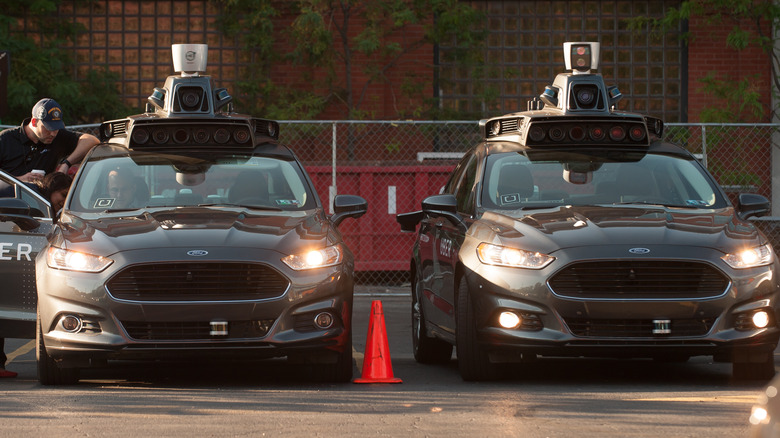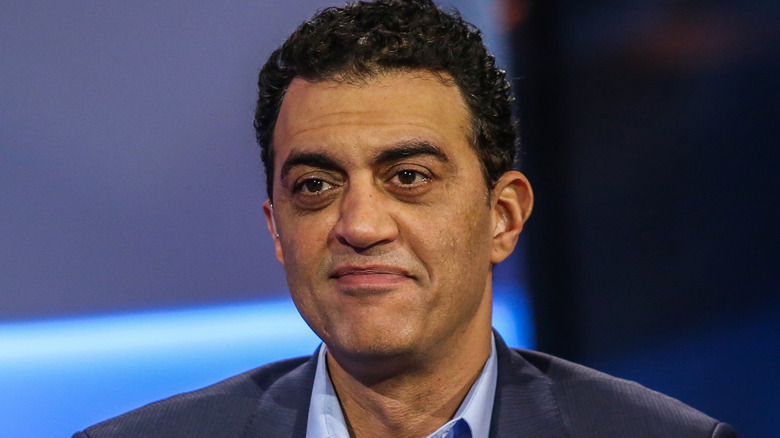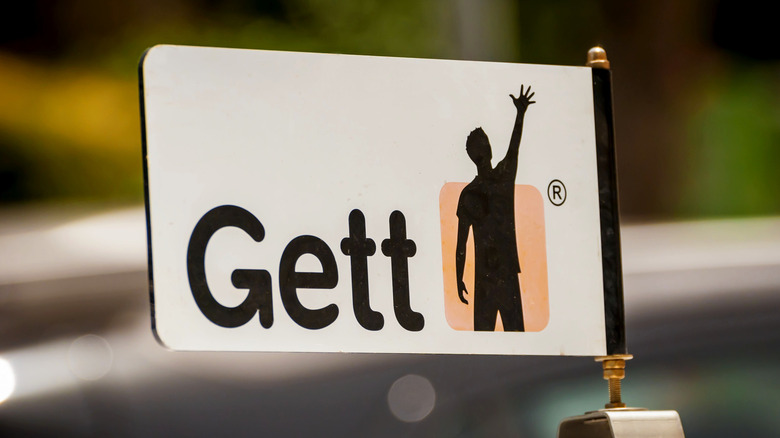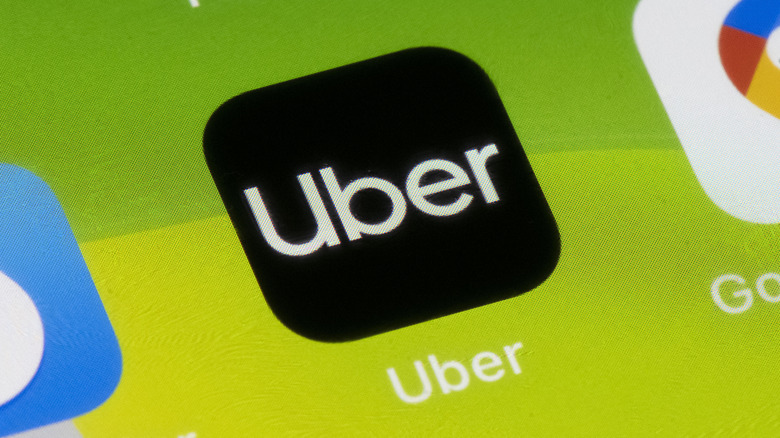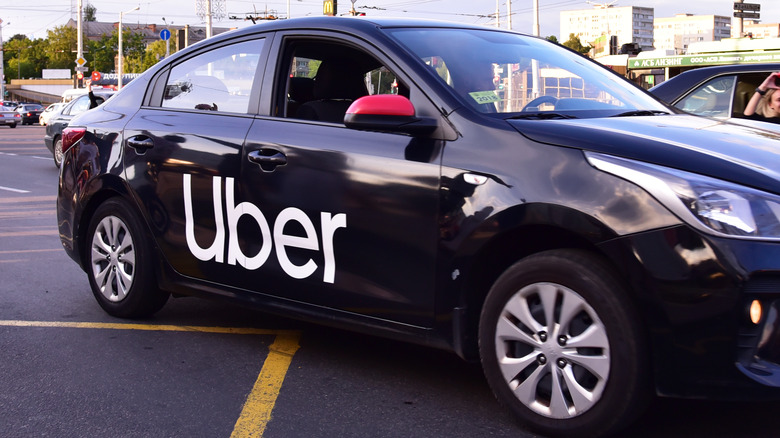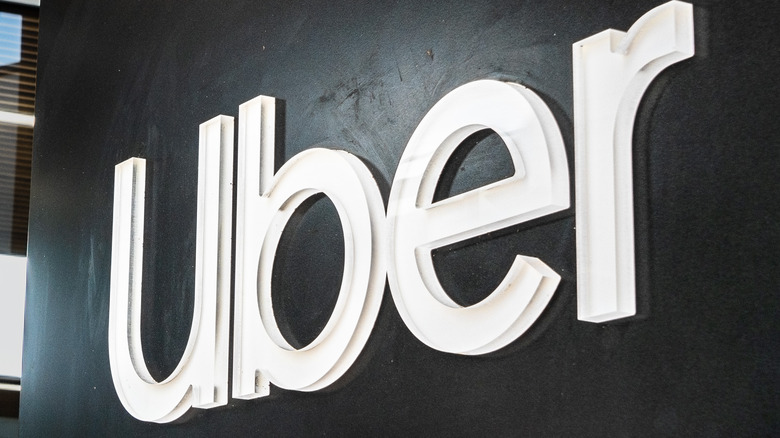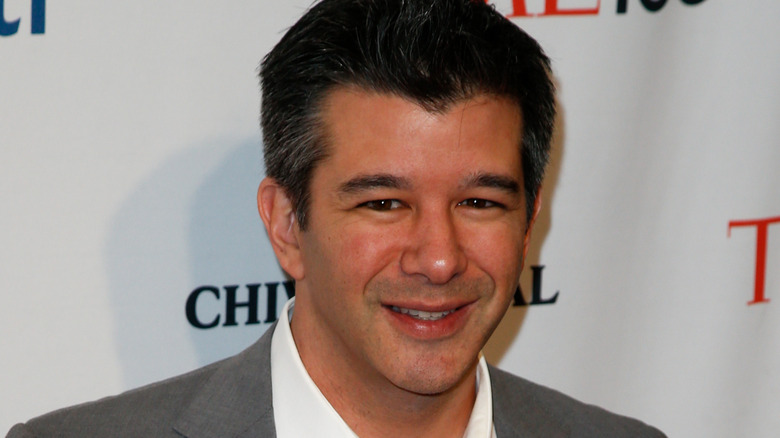The Biggest Scandals To Hit Uber
When the smartphone went mainstream in 2007 with the debut of Apple's iPhone, a technological revolution was underway, changing how millions of people around the world consume information, spend time, and get stuff done. Just three years later, a San Francisco-based startup called Uber would change the way people get from point A to point B in exchange for a fee. Calling itself a "ride-share" app, Uber has led to the slow but inevitable extinction of taxis and private car services. How it works: A user downloads the app, GPS determines their location, and then they order a ride to a local destination. Paid for entirely electronically, a driver soon arrives — a private citizen, not a licensed cab driver, using their own car to make a few bucks. That's another thing — Uber is one of the chief pioneers and purveyors of the "gig economy."
What should be a simple concept has proven oddly and repeatedly controversial, however, with Uber the company and its employees often finding themselves mired in controversy. Here are all the times Uber drove itself into scandalous headlines.
Surge pricing during a natural disaster wasn't a good look for Uber
"Supply and demand" is a basic economic principle that fuels commerce, with the scarcity of a good or service directly relating to its increased cost. Uber instantly manipulates the "invisible hand" of the free market, by automatically enacting a "surge pricing" policy. According to the company's website, when there's more demand for riders in a geographical area than there are free drivers, the resulting scarcity instantly makes the price of an Uber ride double or more. Surge pricing may go into effect on driver-craving holidays like New Year's Eve — when fees increased by as much as sixfold, according to TechCrunch, or after a major sporting event or concert lets out, and while being charged extra surprisingly and suddenly is never going to be popular with consumers, critics felt Uber went too far in November 2012 when surge pricing kicked in during the landfall of Hurricane Sandy in New York City.
According to the Financial Post, customers desperate for a car to take them to higher ground or a place safe from violent weather wound up paying double what they normally would for a weekday ride. Many of those customers registered complaints with Uber on social media. The company immediately stepped in to call off surge pricing but continued to pay drivers double their regular rate, losing Uber about $100,000 in all.
Uber covered up a major data breach
With the online age, the Information Age, and the age of big data all converging into one present-day reality where billions of digital details are floating around the internet and its framework every second of every day, massive breaches of sensitive data are a frightening if frequent fact of life. Either due to poor security measures or hackers actively trying to break in and steal sellable info, many major companies have experienced some kind of episode in this regard, including Uber.
According to a report in the New York Times in November 2017, more than a year prior, Uber was the target of a digital break-in, in which hackers accessed a third-party server and stole the account info of more than 57 million Uber riders and drivers, including names, phone numbers, and email addresses. The hackers then held Uber ransom, demanding $100,000 in exchange for deleting their copy of the hacked info. Uber chief security officer Joe Sullivan, under the direction of CEO Travis Kalanick, went ahead and paid the $100,000. The company then kept the whole affair secret for a year, fearing public embarrassment. To further ensure that the negative news wouldn't get out, Uber representatives found the responsible hackers and made them sign non-disclosure agreements.
Uber's self-driving car division ignored a few laws
In December 2016, following a successful test rollout in Pennsylvania, according to CNET, Uber launched a self-driving car service in San Francisco. Per a company blog post, an autonomous vehicle would be automatically selected for riders ordering a standard UberX ride, should one be free and close. For as long as three months earlier, Uber had been using the self-driving vehicles to collect map data, despite not actually having the proper licensure from the state of California to operate autonomous cars. When Uber started putting paying customers into those cars, the DMV cut them off. "It is illegal for the company to operate its self-driving vehicles on public roads until it receives an autonomous vehicle testing permit," the California Department of Motor Vehicles wrote in a letter to Uber. Within two days, Uber had pulled and garaged all 16 self-driving cars off the streets of San Francisco, per the Los Angeles Times.
Another self-driving car scandal continued to send Uber off the road. Two months later, according to CNBC, Waymo, the autonomous vehicle division of Google parent company Alphabet, filed suit against Uber, alleging that when former engineer Corey Levandowski jumped to Uber-owned startup Otto, he brought with him 14,000 illegally obtained company files, which contained numerous trade secrets. In 2018, Uber settled the suit, agreeing to pay out an equity stake worth about $245 million.
When Uber failed to model a good promotional idea
In 2014, Uber's office in the major French city of Lyon launched a marketing concept that was designed to get attention and capture some media exposure. That's exactly what happened, but probably not in the way that the company or its corporate partners in the matter likely envisioned. According to Buzzfeed News, Uber teamed up with Avions de Chasse — an app-based escort service (according to PandoDaily, via Buzzfeed News). The name is a colloquialism that means "fighter jet," but is a French idiom that translates to the crude English phrase "hot chick." And access to women it described thusly was what Uber's Lyon operation offered riders. App users could enter the promo code "UBERAVIONS" and, according to a post on Uber's website, become "the luckiest co-pilot of Avion" as they enjoyed a free, 20-minute ride around town with one of the women featured on the site.
"It's going to be the most beautiful thing on Earth," Uber Lyon touted, but within a day, the whole thing had been shut down. "It was a clear misjudgment by the local team," an Uber spokesperson told CNN. "We have canceled the partnership on this occasion we clearly misjudged the situation. We apologise to anyone that has been offended," @UberLyon tweeted in response to calls that the marketing stunt hinted at sexism or sex work.
An Uber executive suggested going after reporters who criticized Uber
In 2014, an editor for Buzzfeed News was invited to a dinner at Manhattan's Waverly Inn. Among the guests: Uber CEO Travis Kalanick, who complained that he'd been misrepresented by the media as an unfeeling menace who didn't care about complaints registered by riders and drivers, and that he was really just so busy and determined to grow his company. Emil Michael, Uber's senior vice president of business, ran with the theme, suggesting that the company ought to exact revenge on reporters who mischaracterize them. He was particularly angry with Sarah Lacy, editor of critical tech industry website PandoDaily, who had recently accused Uber of "sexism and misogyny" following its ill-fated tie-in with a French escort service. He wanted to hold Lacy "personally responsible" for the wave of Uber app deletions that followed the reporter's story going viral. Michael suggested spending "a million dollars" to hire a team of reporters and opposition researchers who would devote themselves to digging up and making public personal details about anyone who published anything negative about Uber or its executives.
"The remarks attributed to me at a private dinner — borne out of frustration during an informal debate over what I feel is sensationalistic media coverage of the company I am proud to work for," Michael said via an Uber-issued statement, "do not reflect my actual views and have no relation to the company's views or approach. They were wrong no matter the circumstance and I regret them."
The ribald 'Miami letter' hinted at misbehavior behind the scenes at Uber
Referred to by employees and reporters as the "Miami letter," according to Vox's Recode, Uber co-founder and head Travis Kalanick sent a long missive to 400 employees in 2013 titled "URGENT, URGENT – READ THIS NOW OR ELSE!!!!!" before they gathered at the Shore Club in Miami for a company-sponsored retreat.
After congratulating his employees on Uber's success, Kalanick urged his employees to "have a great f***ing time," but to refrain from vomiting, as it would carry a $200 "puke charge," tossing beer kegs off buildings, and improper coupling with fellow Uber rank-and-file. "Do not have sex with another employee UNLESS a) you have asked that person for that privilege," he wrote, adding that relationships between direct supervisors and their charges were prohibited. (He also threw in an "#FML" because this rule meant Kalanick would have to "be celibate on this trip.")
Other executives reportedly urged Kalanick to not send this letter, as its tone could be considered glib and unprofessional. The letter made headlines when it factored into an investigation by two law firms into sexual harassment and corporate mismanagement at Uber, launched after Ed Baker, the company's VP of product and growth (per Vox's Recode) resigned after reportedly engaging in the kind of impropriety in Miami that Kalanick warned against.
A bunch of Uber executives tried to sink a rival ride-share firm
Uber wasn't a unique or original idea — numerous other ride-sharing services have offered smartphone users car trips at the push of a touchscreen, paid for electronically, including Curb, Lyft, and Gett. When the latter ramped up operations in New York City in 2013 and 2014, according to ValleyWag, Uber engaged in some corporate sabotage in an attempt to knock the upstart off the scene by frustrating its drivers and customers. En masse, employees from Uber signed up for Gett accounts and then scheduled rides with the service. And then, they canceled them, falsely making it seem like all of Gett was booked for large chunks of time (potentially sending disappointed customers to other services, like Uber), and also preventing Gett drivers from being able to book a replacement gig, thus missing out on income.
This wasn't a concerted effort by Uber drivers or low-level employees: 13 Uber executives took part in the scheme, and in high numbers. For example, Uber's New York general manager Josh Mohrer ordered and called off 20 Gett rides in a two-week period, while community manager Kimiko Ninomaya made seven phony requests in one day. After each cancellation, Uber sent a text to the duped Gett drivers attempting to recruit them. The company's PR head Andrew Noyes issued a statement to TechCrunch, calling the plan "too aggressive a sales tactic and we regret the team's approach to outreach of these drivers."
Apple nearly banned the Uber app for gross privacy violations
In 2017, the New York Times ran a profile on embattled Uber co-founder and CEO Travis Kalanick, two months before he'd be ousted from the company after a slew of privacy and harassment scandals (per the NYT). On the brink of his controversy-laden departure, the Times exposed a previously known corporate scandal, one that got the company on the bad side of an even larger tech giant, and which could have sunk the company for good had Kalanick played his hand differently.
Back in 2015, Kalanick was summoned to the Northern California headquarters of Apple, for a meeting with company head Tim Cook. Apple engineers had discovered that Uber had been committing numerous acts of violating privacy without its customers or Apple fully aware of what was going on. Kalanick had told Uber programmers to disguise the code in the company's iPhone app to hide the fact that it had been keeping tabs on customers and former customers who'd deleted the app. That ran afoul of Apple's strict, publicly touted privacy standards. Cook told Kalanick to immediately end the malfeasance, or Apple would boot Uber from its App Store, cutting it off from so many millions of customers that it would likely kill the ride-share company. Kalanick and Uber complied.
Numerous Uber drivers were accused of horrific crimes
Uber's protocol for background checks on its drivers, and the sense that riders who entered the cars of strangers could do so with a feeling of safety, came under fire after a series of violent and shocking incidents involving its freelance operators. In August 2015, in Charleston, South Carolina, Uber driver Patrick Aiello kidnapped a woman and assaulted her inside of his vehicle while on the job, per the Post and Courier. According to the Athens Banner-Herald, Georgia-based driver John Kamen gave a ride to a woman in December 2015, then allegedly followed her into her home, assaulted her, and burglarized the house. And in 2015, police in Kalamazoo, Michigan, fielded a 911 call from an Uber customer who rode in a vehicle driven by Jason Dalton, reporting erratic driving. Uber heard other complaints about Dalton that day, the same day he went on a shooting spree that left six people dead, according to WKYC.
Just after the Kalamazoo tragedy, Uber chief security officer Joe Sullivan said on a media conference call that the company saw no reason to change its screening process. "The perpetrator had no criminal record and if there's nothing on someone's record, no background check is going to raise a flag," Sullivan said. A few months later, Uber pulled out of the Austin, Texas, area completely after voters there refused to overturn a fingerprinting law designed to provide more background info on ride-share drivers, according to News4SanAntonio.
Uber was banned in Delhi after a driver was accused of assaulting a rider
With a population of more than 30 million, Delhi is one of the largest metropolitan areas in the world. India's National Capital Territory is rapidly growing, and it would be an explosive and profitable market for a customer request-oriented service like Uber — except that the ride-sharing app was banned from operating in the city after the accusation of a horrific crime by one of its drivers.
According to the New York Times, Uber debuted in Delhi in December 2013, proving especially popular with women looking for safe transit at night. Months later, driver-by-profession Shiv Kumar Yadav was arrested on a charge of sexual assault against a rider while employed with another service three years prior. He was acquitted, but this matter wasn't picked up by Uber's driver screening system, and Yadav was later arrested and charged with driving a passenger who had fallen asleep to an unpopulated area and assaulted her in the vehicle.
The Delhi government barred Uber from operating in the region, as well as any and all other smartphone-based ride-share apps. In 2015, per the New York Times, Yadav was convicted of assault.
Uber's CEO got in a fight with an Uber driver
Uber CEO Travis Kalanick prefers to use Uber Black, the Uber offshoot that offers more expensive rides in fancy cars. In February 2017, Kalanick took an Uber Black ride that was uneventful until the CEO exited the car upon arrival. The driver, six-year Uber veteran Fawzi Kamel, recorded the encounter with a dashboard camera and gave the footage to Bloomberg. Kamel confronted Kalanick over his issues with Uber, particularly a plan to drop prices on Uber Black to stay more competitive with Lyft, which negatively financially impacted drivers. "People are not trusting you anymore," Kamel said. "I lost $97,000 because of you. I'm bankrupt because of you." After engaging in a few rounds of "did not"/"did too," Kalanick starts to get angry, and calls Kamel's complaints "bulls***," and before slamming the door and leaving, shouts, "Some people don't like to take responsibility for their own s***. They blame everything in their life on somebody else."
The footage went viral and cast Kalanick in a bad light. The CEO sent a company-wide email apologizing. "To say that I am ashamed is an extreme understatement," he wrote. "My job as your leader is to lead, and that starts with behaving in a way that makes us all proud. That is not what I did, and it cannot be explained away." After several Uber scandals and controversies, Kalanick stepped down from the company in June 2017, per the BBC.
